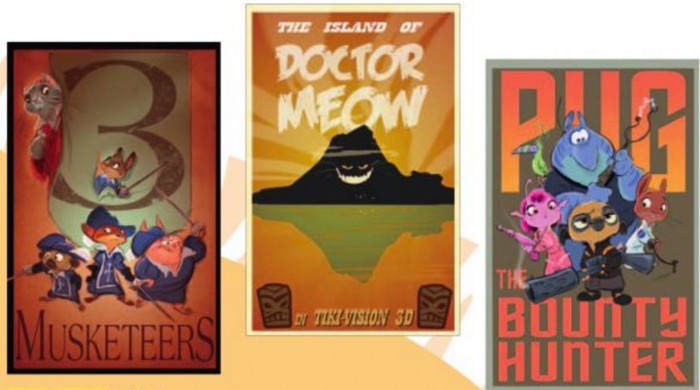'Zootopia' Directors Explain How The Movie Evolved From A 'James Bond' Parody [Exclusive Interview]
Earlier this week we told you how Zootopia was going to be a different movie, originally following Jason Bateman's character Nick Wilde and featuring an more-in-your-face message. Well you might be surprised that the original idea for Zootopia was a James Bond parody featuring talking animals. How the that idea evolve into whats now on the screen? Read my exclusive interview with directors Byron Howard and Rich Moore and discover how a story like this evolves within the Disney Animation Studios creative process.
Zootopia Directors Interview: The Evolution Of The Story
Peter: Okay, so I'm very interested in the evolution of the animation process of how like stories get created and abandoned. I wanna talk a little bit about how this evolved into what it is. Which starts with how you came onto the project. Like what was your initial idea?Byron Howard: The very first place, well when John [Lasseter] asks you to pitch movies, new ideas for movies, he asks you to come in with at least three ideas, because he doesn't want you to just put all your eggs in one basket. And I think Nathan Greno and I who just directed Tangled came in and we pitched I think six ideas to John. And what a lot of those movies had in common were these anthropomorphic animal characters. And John got very excited about that. He said, well I don't know about this one, but I like the animal characters and he got very excited about this idea that he said, "I will fully support any movie that shows animals running around in tiny clothes." That's like exactly what he said. And he said he was on board.Peter: That sounds exactly like John.Byron: Yeah. He just got very excited about it. And he said, "well guys have gotta really make this something different." So we did about nine months of research.Peter: You said that at the screening last night. I'm curious what did he mean by that?Byron: Oh well I think because he said there'd been a lot of these talking animals films. And it's something that people have seen before. So how are you gonna make this different? How are you gonna go beyond what everyone has done before? And if it is gonna be a world of talking animals, it has to make sense. And you guys have to figure out if these animals actually evolved and built a world, what would it look like? And you gotta make it work. And I think that just meant, we need to really know our stuff before we dove into the story.Peter: But it didn't initially take place in Zootopia, right? Like it–Byron: No, but it was an all animal world. I think like he really charged us with sort of just figuring out. It started off as a spy movie. The first version that I pitched after that was–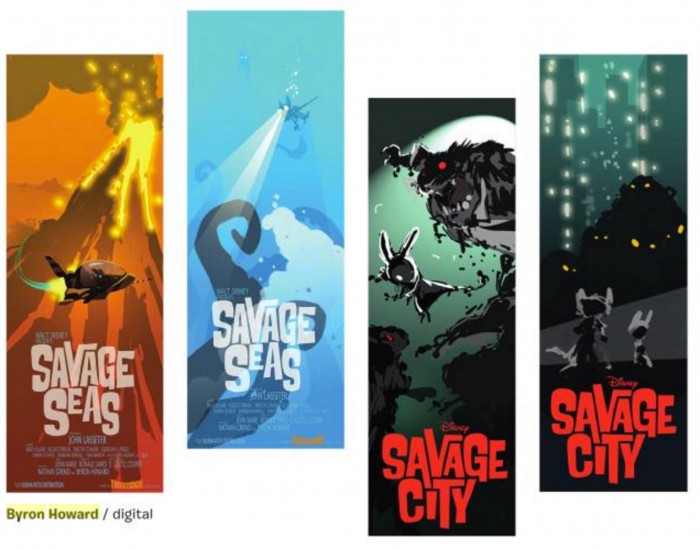 Peter: Who was the spy?Byron: His name was Jack Savage. And he was a Jackrabbit a la James Bond. And this rabbit worked at something like MI6. And his boss was a little tiny mouse kind of like Judi Dench. And that kind of thing. And so there was a size conflict there. But after the first act, the spy character left the big animal city to go into the South Seas. And the title of the movie was Savage Seas. And I thought it was the coolest thing ever. And I had a whole plan of other movies like Savage Earth and the Savage Land and the Savage Times and things where it would just be a series of movies. So I had big plans.Rich Moore: The Savage Chronicles.Byron: The Savage Chronicles. Isn't that cool? That sounds so cool.Rich: Sunday nights on ABC, The Savage Chronicles.Byron: It sounds awesome and I made posters and everything. And the more I pitched this, giving people...Rich: It was a hubris.Byron: Even though people liked the posters, they didn't really like the spy idea. I'm like uh... Kind of like–Rich: They're like I don't like the Roger Moore James Bond movies.
Peter: Who was the spy?Byron: His name was Jack Savage. And he was a Jackrabbit a la James Bond. And this rabbit worked at something like MI6. And his boss was a little tiny mouse kind of like Judi Dench. And that kind of thing. And so there was a size conflict there. But after the first act, the spy character left the big animal city to go into the South Seas. And the title of the movie was Savage Seas. And I thought it was the coolest thing ever. And I had a whole plan of other movies like Savage Earth and the Savage Land and the Savage Times and things where it would just be a series of movies. So I had big plans.Rich Moore: The Savage Chronicles.Byron: The Savage Chronicles. Isn't that cool? That sounds so cool.Rich: Sunday nights on ABC, The Savage Chronicles.Byron: It sounds awesome and I made posters and everything. And the more I pitched this, giving people...Rich: It was a hubris.Byron: Even though people liked the posters, they didn't really like the spy idea. I'm like uh... Kind of like–Rich: They're like I don't like the Roger Moore James Bond movies.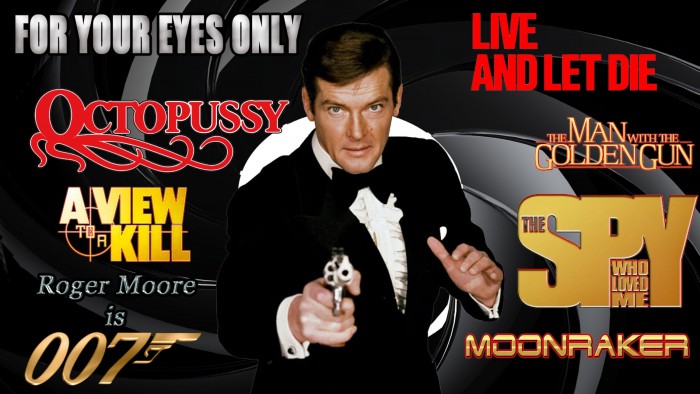 Byron: Oh I like Roger Moore, he's cheeky. But so I quickly abandoned the spy idea because everyone said the most interesting thing about your pitch is this first act where everyone's in this animal city all together. And if you could make that the whole film, that would be a really interesting thing that no one has ever done before. So that's when I chucked the spy thing. And that's when it sort of morphed into this crime procedural kind of hard boiled detective slash cop thing that kind of evolved into that. That's where the pair of Judy Hopps and the rabbit and the fox really sort of started to exist in the primordial form right there. And then it evolved from that point.
Byron: Oh I like Roger Moore, he's cheeky. But so I quickly abandoned the spy idea because everyone said the most interesting thing about your pitch is this first act where everyone's in this animal city all together. And if you could make that the whole film, that would be a really interesting thing that no one has ever done before. So that's when I chucked the spy thing. And that's when it sort of morphed into this crime procedural kind of hard boiled detective slash cop thing that kind of evolved into that. That's where the pair of Judy Hopps and the rabbit and the fox really sort of started to exist in the primordial form right there. And then it evolved from that point.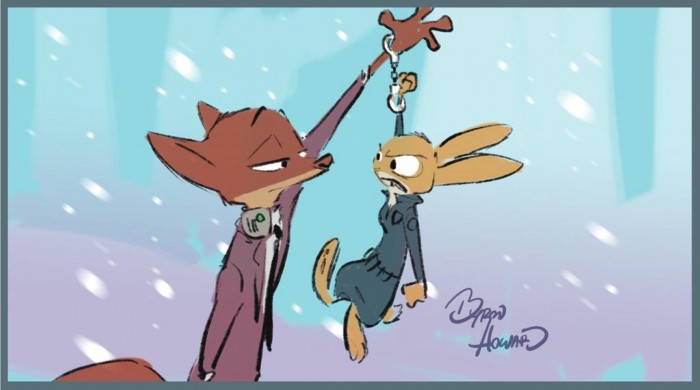 Peter: And we talked a little bit about how Jason Bateman's character Nick Wilde was originally the lead character. How did it work at that point in the story?Byron: Well Nick, he was a very cynical character. He's the same sort of same Jason Bateman charm, but Nick had grown up in the city and predators in that version of the film were treated very poorly by the prey population that were the majority. And even to the fact that to keep prey animals safe and comfortable, predators had to wear these things called "tame collars", which made sure that predators if they got too excited or violent at all, it would give them a little shock, a little reminder. And it seemed like this arrangement that they had come to, but it was very in your face. And it was kind of dystopian. And Nick had this plan. He created a Speakeasy called "Wilde Times," which was a secret predator amusement park where he figured out how to get the collars off and how to let predators enjoy themselves and chase things and kind of go by instinct and just enjoy themselves for the first times in their lives. And it was very interesting and compelling, but it was very dark and people didn't really like the city. Big surprise. But we figured out very early on that if people were gonna love the movie–Rich: We like Nick, but we don't like Sun City.
Peter: And we talked a little bit about how Jason Bateman's character Nick Wilde was originally the lead character. How did it work at that point in the story?Byron: Well Nick, he was a very cynical character. He's the same sort of same Jason Bateman charm, but Nick had grown up in the city and predators in that version of the film were treated very poorly by the prey population that were the majority. And even to the fact that to keep prey animals safe and comfortable, predators had to wear these things called "tame collars", which made sure that predators if they got too excited or violent at all, it would give them a little shock, a little reminder. And it seemed like this arrangement that they had come to, but it was very in your face. And it was kind of dystopian. And Nick had this plan. He created a Speakeasy called "Wilde Times," which was a secret predator amusement park where he figured out how to get the collars off and how to let predators enjoy themselves and chase things and kind of go by instinct and just enjoy themselves for the first times in their lives. And it was very interesting and compelling, but it was very dark and people didn't really like the city. Big surprise. But we figured out very early on that if people were gonna love the movie–Rich: We like Nick, but we don't like Sun City. Peter: So when did you get injected into the development of this film?Rich: Well I had been with the project as a member of the story trust. Like fairly early on.Byron: Yeah, you were there early.Rich: And was involved in kind of pitches and just–Peter: That's kind of like the Pixar brain trust?Rich: Yeah, right, the brain trust, you know, but not as brain, not as smart. We're the story trust. We like stories. We don't got them big brains like up in Emeryville. So I had been kind of running alongside of it from pretty early on.Byron: He'd heard the spy pitches.Rich: Yeah, the spy and well that's cool and then the whole thing with the collars. It was our job as being a support staff in the story trust is to try and help the director realize his or her vision, you know. Never try to kind of say well, what if it's about this instead? It's like we're always there to try and kind of make what the director is thinking kind of come to fruition. And this one was tough. It was pretty hard. And there came a point where like Byron said, that we're not liking Nick anymore. Now he seems sad. Now he seems so oppressed the Jason's not shining in it. And Ginnifer [Goodwin]'s character seems kind of ignorant. How could this bunny who's been raised in this method of collaring people, how do you care about her, she was like the Man. It's like she never questioned like, is this right? That half of our population wears collars. So there was a big moment kind of a come to Jesus moment of saying like I think we need to try a version without these collars. And maybe we should flip our protagonist and see how it works with Judy as our main character. So the discrimination and the oppression and the stereotyping and putting of others in boxes isn't apparent from screen or from frame one of the thing. That we discover it with Judy as she's tracking her case. And realizing that it exists in her also. And lo and behold, it's like that experiment kind of yielded the answer that this is exactly where the story wants to go. Because it just started as we said earlier. Everything just kind of bup-up-up-up, you know. Kind of lined right up. And that's when John asked me and this was in the fall of 2014. And we had about 16 months.Peter: Is that early enough into the development to make those kind of changes?Rich: Well no, it wasn't that early. We still had about a year and a few months to make all these changes.Byron: It's late in the film's life to make changes like that.Rich: In the film's life it was late. Because parts of it were already in production. So but John said, will you jump on board since you know the movie intimately? Will you jump on and you have a sense of what the task is? Will you jump on?Peter: Were you working on your own project?Rich: I was yeah. I was. And I said, absolutely, because that's what we do at the studio. That's if it's all hands on deck, we put down what we're doing and come to be to the service of the movie that's kind of next in the line. And it was if for nothing else just that we had a finite amount of time and a lot of work to do. And it was not a one person job. It was a two person job. Just to make it on time.
Peter: So when did you get injected into the development of this film?Rich: Well I had been with the project as a member of the story trust. Like fairly early on.Byron: Yeah, you were there early.Rich: And was involved in kind of pitches and just–Peter: That's kind of like the Pixar brain trust?Rich: Yeah, right, the brain trust, you know, but not as brain, not as smart. We're the story trust. We like stories. We don't got them big brains like up in Emeryville. So I had been kind of running alongside of it from pretty early on.Byron: He'd heard the spy pitches.Rich: Yeah, the spy and well that's cool and then the whole thing with the collars. It was our job as being a support staff in the story trust is to try and help the director realize his or her vision, you know. Never try to kind of say well, what if it's about this instead? It's like we're always there to try and kind of make what the director is thinking kind of come to fruition. And this one was tough. It was pretty hard. And there came a point where like Byron said, that we're not liking Nick anymore. Now he seems sad. Now he seems so oppressed the Jason's not shining in it. And Ginnifer [Goodwin]'s character seems kind of ignorant. How could this bunny who's been raised in this method of collaring people, how do you care about her, she was like the Man. It's like she never questioned like, is this right? That half of our population wears collars. So there was a big moment kind of a come to Jesus moment of saying like I think we need to try a version without these collars. And maybe we should flip our protagonist and see how it works with Judy as our main character. So the discrimination and the oppression and the stereotyping and putting of others in boxes isn't apparent from screen or from frame one of the thing. That we discover it with Judy as she's tracking her case. And realizing that it exists in her also. And lo and behold, it's like that experiment kind of yielded the answer that this is exactly where the story wants to go. Because it just started as we said earlier. Everything just kind of bup-up-up-up, you know. Kind of lined right up. And that's when John asked me and this was in the fall of 2014. And we had about 16 months.Peter: Is that early enough into the development to make those kind of changes?Rich: Well no, it wasn't that early. We still had about a year and a few months to make all these changes.Byron: It's late in the film's life to make changes like that.Rich: In the film's life it was late. Because parts of it were already in production. So but John said, will you jump on board since you know the movie intimately? Will you jump on and you have a sense of what the task is? Will you jump on?Peter: Were you working on your own project?Rich: I was yeah. I was. And I said, absolutely, because that's what we do at the studio. That's if it's all hands on deck, we put down what we're doing and come to be to the service of the movie that's kind of next in the line. And it was if for nothing else just that we had a finite amount of time and a lot of work to do. And it was not a one person job. It was a two person job. Just to make it on time.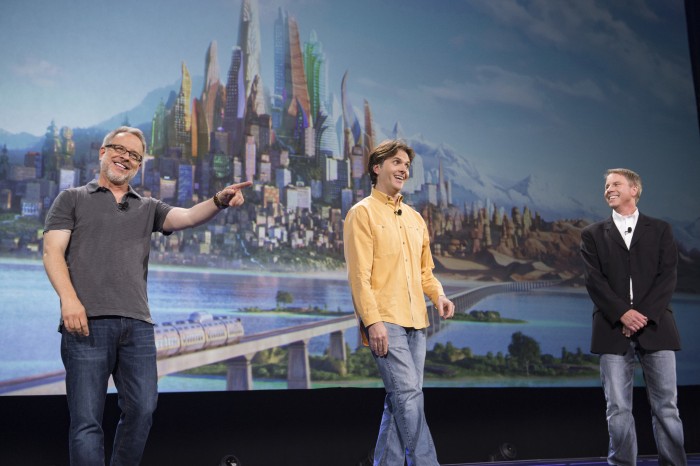 Peter: I noticed both of you have voice cameos.Byron: Yeah, we do.Peter: So who are you in the film and how did that happen?Byron: Well, you know, when we put these movies together, we assemble rough–Rich: It's reluctant. It's reluctant credits, you know.Byron: Reluctant stars, frustrated actors it's like... We put these movies together, we do many, many versions of them with rough storyboards and we do what's called scratch dialogue, which means it's just a bunch of us–Rich: It's temp dialogue, because if we had Jason and Ginnifer and the rest of the cast in to voice every iteration of the thing, they would get so burned out and just like what are we doing.Byron: Yeah, right.Rich: You know, why do we have to do this over and over again? So a lot of times it'll just be like let me get behind the mic, you know, and just give a temp line for a part of just imitating Jason or whoever. It just so we can see if something's working. And sometimes it's like we'll do these parts that they'll stick.Byron: They'll stick. It'll get a laugh.Rich: It'll get a laugh or it'll start to feel like that's exactly how it should be. And the time will come when it we'll say okay, who are we gonna cast for this part? And we'll present some options to John. And he'll say well "no, why are we changing that? I love that." It's like "well that's me doing that, John." "Well that's staying in. It's really good." Then you've got the part. And it's like on the...Byron: Yeah. And there have been times where we've actually tried to swap in legitimate actors and it actually screws stuff up because there's some little magic happening that doesn't, that it's–Rich: There's just some sort of juju that if you start to monkey with the chemistry of it, it can just throw the whole thing off. So...Peter: So who are you guys in this film?Rich: I am the Doug.Byron: You're a naughty sheep.Rich: Yeah, the sheep that's (spoiler text, highlight to reveal) going around shooting people with the serum.(/end spoiler text)Byron: You can, I wonder if it's a spoiler. If it's a spoiler, you can just call him a naughty sheep. You're also one of the wolves too.Rich: That's right.Byron: He's also one of the howling wolves. And then I, myself and Jared Bush, our co-director and one of our writers, are the noisy neighbors, Bucky and Pronk. The noisy guys, shut up, you shut up. Those guys. It was a good part. So I was hoping that one would stick. 'Cause I thought it was funny. I always laughed when I heard it, so I was, you know, you kind of hope sometimes those things stick. But it's nice to once in a while, 'cause I was in Tangled, I got to be the Buckethead Thug.Rich: Buckethead Thug?Byron: He's the guy with the bucket on his head who's like "I could use the money." That's my line. But it's just these stupid, little lines. And I'm also–Rich: You're wearing a bucket on your head.Byron: I'm wearing a bucket on my head, so well, you know...Rich: I can get that corrective surgery.Byron: Yeah, it's a, we have SAG cards too. We try to be legit, but anyway, what are you gonna...?Peter: One last question...Rich: About that Buckethead though. Where is he from? What's his story?Byron: Yeah, what accent was that?
Peter: I noticed both of you have voice cameos.Byron: Yeah, we do.Peter: So who are you in the film and how did that happen?Byron: Well, you know, when we put these movies together, we assemble rough–Rich: It's reluctant. It's reluctant credits, you know.Byron: Reluctant stars, frustrated actors it's like... We put these movies together, we do many, many versions of them with rough storyboards and we do what's called scratch dialogue, which means it's just a bunch of us–Rich: It's temp dialogue, because if we had Jason and Ginnifer and the rest of the cast in to voice every iteration of the thing, they would get so burned out and just like what are we doing.Byron: Yeah, right.Rich: You know, why do we have to do this over and over again? So a lot of times it'll just be like let me get behind the mic, you know, and just give a temp line for a part of just imitating Jason or whoever. It just so we can see if something's working. And sometimes it's like we'll do these parts that they'll stick.Byron: They'll stick. It'll get a laugh.Rich: It'll get a laugh or it'll start to feel like that's exactly how it should be. And the time will come when it we'll say okay, who are we gonna cast for this part? And we'll present some options to John. And he'll say well "no, why are we changing that? I love that." It's like "well that's me doing that, John." "Well that's staying in. It's really good." Then you've got the part. And it's like on the...Byron: Yeah. And there have been times where we've actually tried to swap in legitimate actors and it actually screws stuff up because there's some little magic happening that doesn't, that it's–Rich: There's just some sort of juju that if you start to monkey with the chemistry of it, it can just throw the whole thing off. So...Peter: So who are you guys in this film?Rich: I am the Doug.Byron: You're a naughty sheep.Rich: Yeah, the sheep that's (spoiler text, highlight to reveal) going around shooting people with the serum.(/end spoiler text)Byron: You can, I wonder if it's a spoiler. If it's a spoiler, you can just call him a naughty sheep. You're also one of the wolves too.Rich: That's right.Byron: He's also one of the howling wolves. And then I, myself and Jared Bush, our co-director and one of our writers, are the noisy neighbors, Bucky and Pronk. The noisy guys, shut up, you shut up. Those guys. It was a good part. So I was hoping that one would stick. 'Cause I thought it was funny. I always laughed when I heard it, so I was, you know, you kind of hope sometimes those things stick. But it's nice to once in a while, 'cause I was in Tangled, I got to be the Buckethead Thug.Rich: Buckethead Thug?Byron: He's the guy with the bucket on his head who's like "I could use the money." That's my line. But it's just these stupid, little lines. And I'm also–Rich: You're wearing a bucket on your head.Byron: I'm wearing a bucket on my head, so well, you know...Rich: I can get that corrective surgery.Byron: Yeah, it's a, we have SAG cards too. We try to be legit, but anyway, what are you gonna...?Peter: One last question...Rich: About that Buckethead though. Where is he from? What's his story?Byron: Yeah, what accent was that?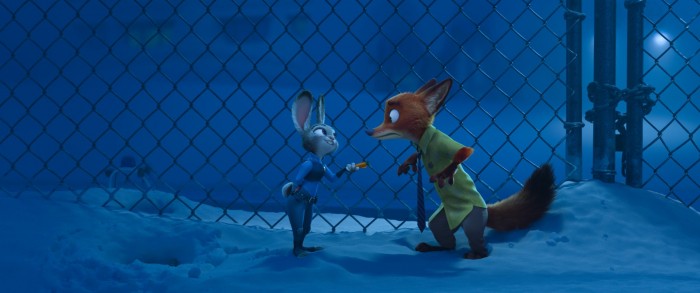 Peter: When I was talking to Ginnifer and Jason, they both, when you changed it from Nick to Judy as the lead character, they both were not specifically told that had happened and later just found out about the changes during a voice session. So I was wondering like how does that come about...Byron: Oh well it was evolving so quickly at the time and I think it was something that we were trying and we weren't sure it was gonna work. And then once it did work, they were such professionals, like they just went with it. It had always been sort of a what's called like a two-hander. Like both characters had always sort of vied for who's story is this? And so there was a fairly good balance of number of lines in the movie. But suddenly things like Wilde Times, which had been a big part of the movie were going away. And the collars were going away. And Jason was like well...Rich: So is this the part with the collar?Byron: Yeah, like oh yeah, we don't have that. Yeah.Rich: And it becomes insane. I think that we're just moving so fast at some point that we're trying to keep everyone updated on the fly. And it's not a perfect system. And maybe we kind of try to explain it too fast one time and it's like what are they talking about? And then they kind of catch up to what we're trying to talk about. And it's late. So yeah, I mean, God bless them, they or anyone that works on animated films, actors, because they really see us at our most manic. And it's just, it gets so thrashy and it's just like a big muh, brain dead Frankenstein kind of like we gotta do something. Thrashing about the room, but they are such good sports. And just always brought it every time.Byron: And you said it very well early on, it's like this movie is very much like Toy Story. It's like you can't have Woody without Buzz. You can't have Buzz without Woody. And it's like we just took who's in the buddy, Woody role and put them in the Buzz role and vice versa. It just and it's like the movie is the two of them. And it really that their dynamic stayed kind of the same is just we just changed how the audience got into the film.Rich: Yeah, because it never became kind of like oh well you're the supporting character. So...Byron: Yeah, it was never that.Rich: "We're gonna cut your salary in half. You get a third of the lines now and no toy of your character."Peter: In the end, I think you have stronger arcs and stronger characters for it because you were treating both of them as the...Rich: Absolutely. Because... Yeah.Byron: The lead.Rich: And I think that Nick was becoming something that was not using Jason for all his power.Byron: It was getting too dark, too sad I think.Rich: And Judy was, it wasn't like what Ginnifer was good at. And once we kind of switched them, it's like both of them were kind of in their element. It's just like the dialogue for Jason became really juicy and he knew kind of just how to play it. And Judy became so kind of bright eyed and determined, yet, you know, kind of a little naïve that Ginnifer, it just fell right into both of their wheelhouses. And they were wonderful.Peter: Well thank you, guys.Byron: Thank you.Rich: Thank you, great talking to you.Peter: Thank you.
Peter: When I was talking to Ginnifer and Jason, they both, when you changed it from Nick to Judy as the lead character, they both were not specifically told that had happened and later just found out about the changes during a voice session. So I was wondering like how does that come about...Byron: Oh well it was evolving so quickly at the time and I think it was something that we were trying and we weren't sure it was gonna work. And then once it did work, they were such professionals, like they just went with it. It had always been sort of a what's called like a two-hander. Like both characters had always sort of vied for who's story is this? And so there was a fairly good balance of number of lines in the movie. But suddenly things like Wilde Times, which had been a big part of the movie were going away. And the collars were going away. And Jason was like well...Rich: So is this the part with the collar?Byron: Yeah, like oh yeah, we don't have that. Yeah.Rich: And it becomes insane. I think that we're just moving so fast at some point that we're trying to keep everyone updated on the fly. And it's not a perfect system. And maybe we kind of try to explain it too fast one time and it's like what are they talking about? And then they kind of catch up to what we're trying to talk about. And it's late. So yeah, I mean, God bless them, they or anyone that works on animated films, actors, because they really see us at our most manic. And it's just, it gets so thrashy and it's just like a big muh, brain dead Frankenstein kind of like we gotta do something. Thrashing about the room, but they are such good sports. And just always brought it every time.Byron: And you said it very well early on, it's like this movie is very much like Toy Story. It's like you can't have Woody without Buzz. You can't have Buzz without Woody. And it's like we just took who's in the buddy, Woody role and put them in the Buzz role and vice versa. It just and it's like the movie is the two of them. And it really that their dynamic stayed kind of the same is just we just changed how the audience got into the film.Rich: Yeah, because it never became kind of like oh well you're the supporting character. So...Byron: Yeah, it was never that.Rich: "We're gonna cut your salary in half. You get a third of the lines now and no toy of your character."Peter: In the end, I think you have stronger arcs and stronger characters for it because you were treating both of them as the...Rich: Absolutely. Because... Yeah.Byron: The lead.Rich: And I think that Nick was becoming something that was not using Jason for all his power.Byron: It was getting too dark, too sad I think.Rich: And Judy was, it wasn't like what Ginnifer was good at. And once we kind of switched them, it's like both of them were kind of in their element. It's just like the dialogue for Jason became really juicy and he knew kind of just how to play it. And Judy became so kind of bright eyed and determined, yet, you know, kind of a little naïve that Ginnifer, it just fell right into both of their wheelhouses. And they were wonderful.Peter: Well thank you, guys.Byron: Thank you.Rich: Thank you, great talking to you.Peter: Thank you.

